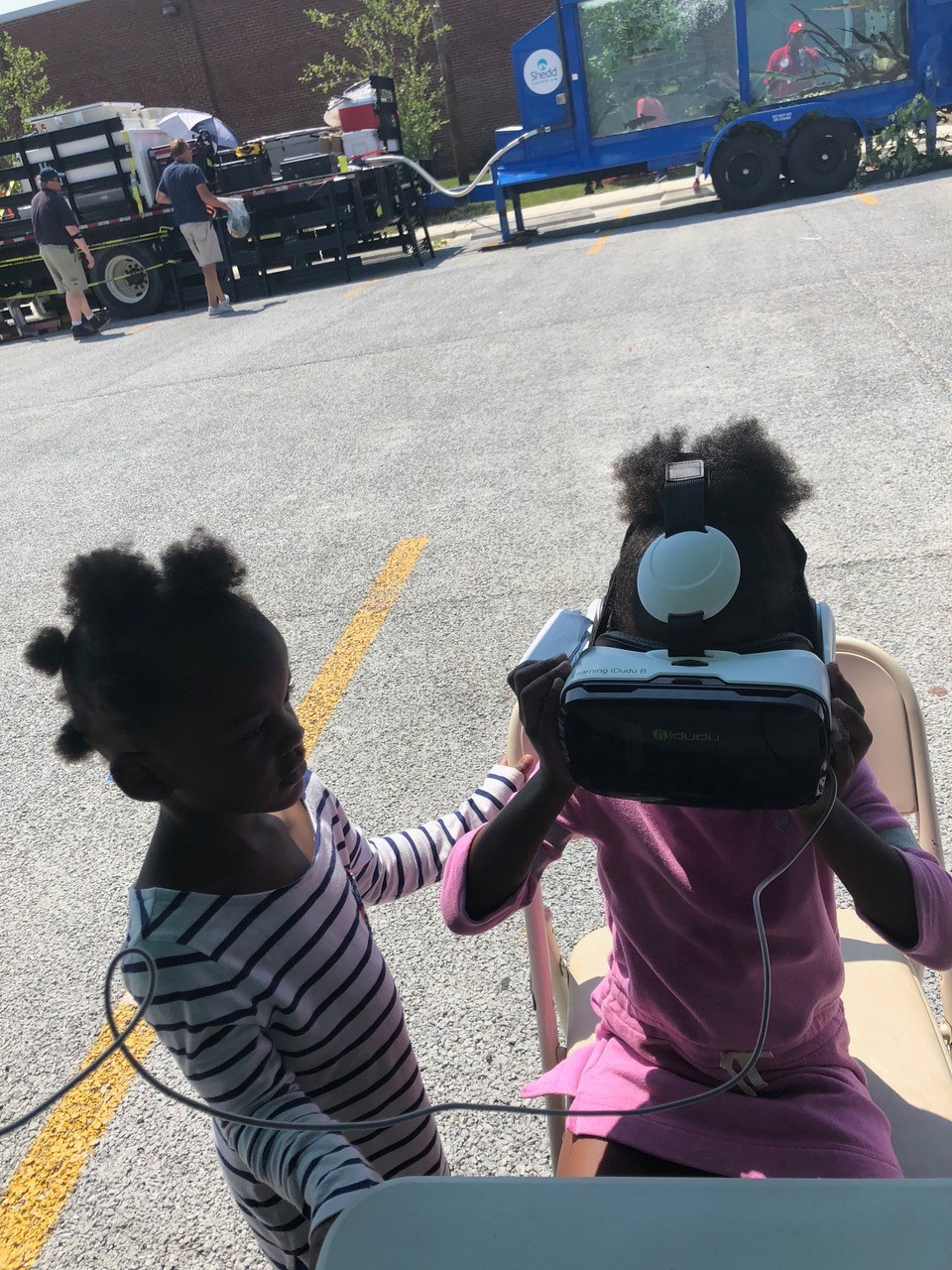Shedd’s Mobile Aquarium Brings Fishy Delight To Altgeld Gardens
By Linda Paul

Shedd’s Mobile Aquarium Brings Fishy Delight To Altgeld Gardens
By Linda PaulWithin its own space, Chicago’s Shedd Aquarium exposes city folk to the mysteries of aquatic life. But now, the Shedd wants to broaden the experience, taking it to where people live and play.
In that vein, staff at the aquarium tried something new this summer. After brainstorming with local community and cultural groups, they decided to bring Chicagoans eyeball-to-eyeball with their hidden underwater neighbors — the fish of Lake Michigan.
Taking it to the street
So the Shedd rented a 2,200-gallon mobile aquarium and programmed some fish-human tête-à-têtes in a variety of parks and neighborhoods spread out across Chicago. First, there was a trial run on Northerly Island. Then, they took their show on the road to St. Sabina Church in the Auburn Gresham neighborhood. On to Humboldt Park, Jackson Park, Columbus Park, and Douglas Park. The final stop of the season was Altgeld Gardens — public housing made somewhat famous by community organizing work done there years ago by a young man named — ummmm, what was it again? Oh yeah, Barack Obama.
Altgeld residents, young and old, were drawn to the massive mobile aquarium. Tracy Rogers came with four children in tow. They walked around the aquarium several times — viewing its inhabitants from all angles. Rogers’ granddaughter tried to commandeer the group’s attention, instructing them to look at the scales of one particular fish. But Rogers was fixated on another aspect of the same fish.
“I wonder how his teeth look?” she said and then told her grandson, “ Take a picture so we can Google that and see how his mouth looks when it’s open!”

Rogers then wandered over to Christina Biggs, a marine biologist wearing a blue Shedd T-shirt. As others had done this day, Rogers thanked her. But then she launched into a volley of questions about the logistics: Do a lot of the fish die when transferred from the museum to the traveling aquarium? Do Shedd staffers get attacked by fish in the process? Is it complicated to put all this up?
In brief, the answers are no, no, and yes.
Biggs explained that fish safety is their chief concern and they know how to protect them. No, they don’t get attacked during the fish transfers. And yes, there’s a lot that goes into getting the fish here.

Lots of logistics
To the public, this setup may look simple, but there are many details involved in taking this show on the road.
“These fish typically live at 70 degrees,” Biggs said. “So we need to make sure we can control their temperature. They produce waste. So we need to make sure the water stays clean and healthy for them.” Plus, there’s an aerator to pump oxygen into the water.
Staffers arrive at the Shedd between 5 and 6 a.m. to get the process going. The fish are placed into specialized transport pods. By the time staff drives away from the museum, they’re loaded down with an array of equipment that includes an empty 2,200-gallon aquarium on wheels. Meanwhile, a separate water truck meets them at their destination to start the process of filling the mobile aquarium and de-chlorinating the water. They also hook up a generator for redundancy — just in case local power goes out.
It’s a process that hours later the staff will do in reverse.
Virtual reality goggles immerse you in the habitat
In addition to the mobile aquarium, the traveling exhibit included a chance for kids and adults to put on virtual reality goggles to view a 360-degree video shot off the coast of the Bahamas. The Shedd has an 80-foot research vessel that’s often stationed there for ongoing shark research. There were oohs, aahs, and punctuated shrieks as children look up, down, and sideways — which provides the startling visual sensation of actually swimming underwater with the sharks!

Just say no — to single-use plastics
Ten-year-old Justice Stipe planted herself alongside the aquarium 0n wheels, absorbed in one of the activities for older kids. They’ve been asked to note markings and other details about the fish, describe their behavior, and make a drawing.

Justice said she likes fish, she likes to go to the beach, and is disturbed by all the trash she sees strewn along the shore of Lake Michigan. “It’s dirty a lot,” she said. “But if you help it, it’s going to make the creatures that live there — they’re going to be be happier without chewing on something that can make them die.”
So when she goes to the beach, she brings along a giant garbage bag and picks up straws and other plastics.
It’s the kind of message this mobile aquarium is designed to promote.
Shedd staff estimate their mobile aquarium was viewed by about 3,000 people across eight sites this summer. Now the staff is engaged in post exhibit discussions about who they reached and the effectiveness of their message.
Shedd officials said after those discussions, they’ll decide whether they should try it all again next summer.
Linda Paul is a contributor to WBEZ.